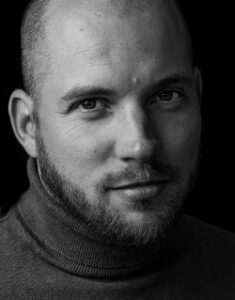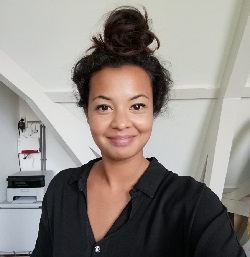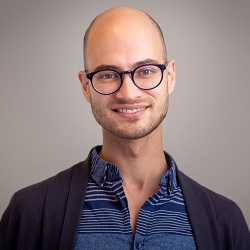
Martina Amoksi obtained her PhD degree in September 2023 at the Vrije Universiteit of Amsterdam with a dissertation on the historical analysis of the influence of the multinational SBM/Suralco on Maroon communities in Suriname. She studied history at the Institute for the Training of Teachers (IOL) where she obtained her MO-B diploma and completed her master’s degree in history at the university of Amsterdam. Currently, she is a full-time lecturer at the Anton de Kom University of Suriname. As a research fellow at KITLV she works on the research project ‘Kawina Ndyuka and Pamaka Maroon historical and contemporary use of Traditional Territory’.
Since 2007 she has been doing research on the Maroons in Suriname and has written various articles and given presentations nationally and internationally about the Maroons. Her book was published in 2009: De Marronvrouw in de stad. Een historische analyse van de invloed van urbanisatie op Marronvrouwen in Suriname, in the NiNsee/Amrit series.

Hebblethwaite, Benjamin
Benjamin Hebblethwaite is a professor in the department of Languages, Literatures, and Cultures at the University of Florida, where he teaches courses on linguistics and culture focused on Haitian Creole and French. His books include A Transatlantic History of Haitian Vodou, Stirring the Pot of Haitian History: by Michel-Rolph Trouillot (with Mariana Past), and Vodou Songs in Haitian Creole and English. He received a 12-month 2024-25 fellowship from the National Endowment for the Humanities as well as 3-month fellowship from the Royal Netherlands Institute of Southeast Asian and Caribbean Studies in Leiden to work on the book project, The Songs and Prayers of Sèvis Ginen: Historical Linguistic Approaches to Haitian Vodou. Ben’s journey into Netherlandic studies began with Afrikaans in 1993, including a year in South Africa studying the language in 1995-96, a semester at the KU Leuven in 1999, and decades of reading inspired Dutch-language books.
At KITLV Ben will focus on writing the historical analysis of the Kingdom of Hueda and its main Vodun temple, the Slangenhuis (Snake House) and its Slangendienst (Snake Service), based on the singular observations of Willem Bosman (1703: 133-173). The religious tradition of serpent veneration has become a leading feature of Haitian Vodou’s Rada and Dahomian Rites through spirits like Danbala, Ayida Wèdo, and Danyi Dangbesi, among others, as well as in Winti traditions in Suriname where fodoe dagwe is venerated. Hougan (Vodou Priest) Max Beauvoir’s (2008a and 2008b) important collections of Haitian Vodou songs contain hundreds of references to these snake lwas (spirits) that originally hail from religious communities located in contemporary Benin. Bosman (1703) is among the earliest eyewitness reports of this African religious forebear that flourished in Haiti and Suriname. In Leiden I will research and write about Bosman’s (1703) account, learn more about Winti traditions, exchange ideas with specialists of Caribbean and African colonial history and language, and I will seek resources and collaboration at Leiden University Library.

Jagt, van der Hans
Hans van der Jagt obtained his PhD from the Vrije Universiteit Amsterdam with a dissertation on the historical relationship between geopolitics, colonialism, militarism and ethics. He studied History at the University of Groningen and the Karl-Franzens Universität in Graz (Austria). Currently dr. Hans van der Jagt works as a associate senior research fellow at KITLV on the research-project ‘The role of the House of Orange-Nassau in colonial history’ and as a associate senior research fellow at the Institute of Security and Global Affairs of Leiden University. Furthermore he works for the Peace and Security Commission of the Advisory Council on International Affairs.
In his work Van der Jagt focuses on the history of colonial structures of power, geopolitical developments, military and international security strategy, defense-policy and emerging disruptive technologies. He wrote academic articles, government research-reports, and policy briefs and published the book Engelen uit Europa (Prometheus, Amsterdam 2022).

Matthee, Mariëlle
Mariëlle Matthee studied English literature at the University of Liverpool and she is a lecturer at Leiden University. Mariëlle has a background in environmental law (PhD in international law) and combines the legal perspective with literature in her research. During her last research, she focused on the Maori language language in New Zealand, and rediscovered the importance of indigenous cultures and languages and their use of poetic language to safeguard nature.
Her current project, which will run from September 2024 to September 2025, uses an esoteric approach to explore the ways of nonhuman communication in environmental governance.

Setijawati Soemarwi, Vera Wheni
Vera has started her career as an advocate. Her work focuses on access to justice and collective legal movement within the context of climate-related water management in an urban context. She has been involved in research on violations of human rights, land rights, properties, and development for the public interest. Her prior work has brought her to write research topics in those areas.
She is currently working on a PhD dissertation about access to justice for marginalized people facing climate-related water management issues in Jakarta, with Diana Suhardiman (KITLV) and Adriaan Bedner (VVI/KITLV) as supervisors. Her research focuses on marginalized communities’ efforts to seeking justice through collective action and social movements when they become victims of climate change adaptation programs. It looks at the process of enforcing and implementing the rule of law in the development of water development program in Jakarta, in response to climate change, and its relations with public interest. She is currently researching the contestation of debates between legal and illegal kampong dwellers, informal settlements, and informal land tenure ownership of urban communities. The book is a reflection of marginalized communities’ involvement in Jakarta to vindicate and achieve justice in resettlement of kampung dwellers.

Tulder, Mirelle van
Mirelle van Tulder is the Atelier KITLV-Framer Framed Artist in Residence for 2024. Mirelle will start her residency in 2024 followed by a public presentation in 2025 at Framer Framed.Mirelle van Tulder holds an MA in Fine Art and Design from Werkplaats Typografie (2021-2023). She was a Research Associate at the Research Center for Material Culture, Wereldmuseum (2021-2023). Mirelle has worked as an image researcher for MacGuffin Magazine from 2019-2023.
During the Atelier KITLV-Framer Framed Artist in Residence program, Mirelle plans to investigate how graphic design has determined the classification of cultures and objects. By re-contextualizing archived materials such as catalogues and photo albums, she aims to reclaim the authority of the material and its associated histories. The aim of her research is to help us understand how power is organized through publishing doctrines, and to reveal the colonising principles that structure them. More.

Vermeulen, Remco
Remco Vermeulen is coordinator for international cooperation on collection management at the Cultural Heritage Agency of the Netherlands, working on knowledge exchange and capacity building programmes in the context of the International Heritage Cooperation programme which is part of the International Cultural Policy of the Netherlands, as well as for the Consortium Colonial Collections.
Remco is an external PhD candidate at the Erasmus School of Social and Behavioural Sciences. His research focuses on colonial heritage engagement, particularly by young people, in postcolonial Indonesian cities. His teaching focuses on gentrification, colonial and postcolonial urbanism, particularly in Indonesia, the bilateral, cultural relationship between Indonesia and the Netherlands. For his previous position as advisor for cultural cooperation with Indonesia at DutchCulture, in 2023 Remco published article series ‘The story of the Erasmus Huis’, the cultural centre of the Dutch Embassy in Jakarta, with two Indonesian historians. The articles, along with short videos based on the articles’ content, have also been published in Indonesian on Historia.id.

Vlugt, Debby Esmeé de
Debby Esmeé de Vlugt is a lecturer in the History of International Relations at Utrecht University and an affiliated fellow at the KITLV in September and October 2024. She specializes in the global history of the Black Power movement, with a key interest in transnational exchanges between activists in the United States and the Kingdom of the Netherlands (including the former Netherlands Antilles and Suriname) in the 1960s and 1970s. She recently defended her PhD on this topic at Leiden University (2024) and before that completed an MSt in History at the University of Oxford (2017).
During her affiliated fellowship at the KITLV, Debby Esmeé will be working on an edited volume titled A History of Surinamese Anticolonial Thought: Resistance, Resilience, and Decolonial Imagination in the Twentieth Century, which she is co-editing with Peter Meel. Each chapter of this volume will cover at least one anticolonial thinker from Suriname or the Surinamese diaspora, ranging from political organizers to visual artists, authors, and poets. The aim of this volume is to demonstrate the diversity and complexity of the Surinamese anticolonial tradition and make its history more accessible to an international audience. The volume will be published by Bloomsbury and is expected to appear in 2026.
OUR FELLOWS
Our institute hosts several international research fellows. KITLV fellows are invited to present lectures, participate in seminars and cooperate in the institute’s research projects. This page lists, in alphabetical order, the affiliated and visiting fellows currently staying at the KITLV/Royal Netherlands Institute of Southeast Asian and Caribbean Studies.
Also interested in becoming a fellow at our institute? Click here to check out the different types of fellowships we have available at KITLV.



